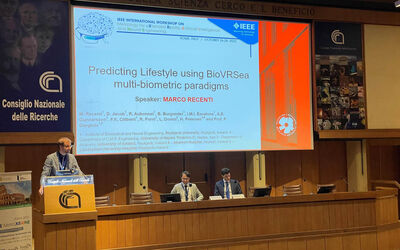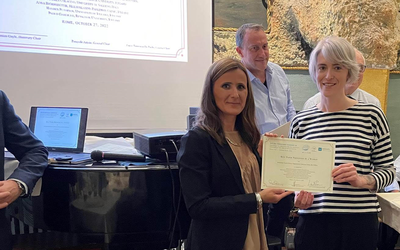Doctoral students from the IBNE institute at RU awarded in Rome
IEEE MetroXRAINE conference in Rome 2022, which stands for the International Conference on Metrology for eXtended Reality, Artificial Intelligence, and Neural Engineering
Four PhD students of the Institute of Biomedical and Neural Engineering (IBNE) recently attended the IEEE MetroXRAINE conference in Rome 2022, which stands for the International Conference on Metrology for eXtended Reality, Artificial Intelligence, and Neural Engineering. Two of them, Marco Recenti and Deborah Jacob won individual prizes for research presented during the conference: Marco won the best PhD Contribution award, and Deborah won the Best Paper Presented by a Woman award.
IBNE draws together scientists, medics, and engineers from across Iceland to create progress in neuroscience, biomedical engineering, tissue engineering and clinical research that can have a significant social impact in Iceland and internationally. IBNE operates within the Medical Technology Center, which is an infrastructure established by Reykjavik University and Landspitali to strengthen the impact of Biomedical Engineering expertise in clinical environments.
Part of the work of IBNE is research into motion sickness and postural control using BioVRSea, a unique virtual reality, multi-instrumented environment which studies the physiology of motion sickness and postural control using multiple bio-metric signals such as heart rate, electroencephalography, and electromyography. Both Deborah and Marco won prizes in the conference for work carried out in the BioVRSea lab (you can easily find the lab in the “Sun” in RU building).

Marco's work evolves around studying possible lifestyle influences on motion sickness using Machine learning and bio-measurements from the BioVRSea acquisitions. This research follows previous studies about lifestyle impact on elderly subjects where some soft tissue parameters extracted from CT-Scans were able to predict hypertension and diabetes. The awarded study aims to understand how much impact lifestyle has during an induced motion sickness experiment and how a healthy lifestyle can positively alleviate the symptoms of motion sickness.
Deborah's work investigated the symptoms of Early-Stage Parkinson's Disease using the BioVRSea setup. The awarded study could greatly impact and improve the therapeutic approach to Parkinson's Disease and people affected by neurological diseases. Marco and Deborah, together with other members of IBNE have previously published work about BioVRSea.

Future works for the BioVRSea lab include the deepening of the lifestyle and Parkinson studies as well as the creation of a large database of healthy subjects to understand better what happens in the body during a motion sickness task and what are the bio-signals that influence and cause the symptoms.
Marco started his Ph.D. in January 2020 after his master's in ICT engineering obtained at the Polytechnic University of Turin, Italy. His main research topic is the application of machine learning and prediction models for assessment and diagnosis in advanced Digital Health Engineering. His researches range from sarcopenia and aging to motion sickness and postural control studies. He recently completed an exchange as Ph.D. visiting student at Chonnam National University in South Korea.
Deborah began her Ph.D. in January 2021, having worked for many years as a medical physicist in the neurophysics department of Beaumont Hospital, Dublin. The main theme of her Ph.D. is researching the translational utility of BioVRSea with clinical populations such as people who have suffered concussions and Parkinson's Disease patients.

